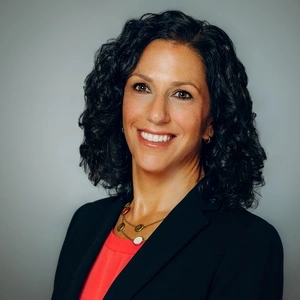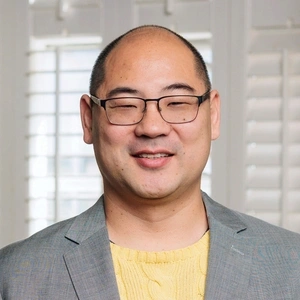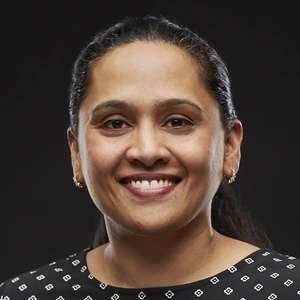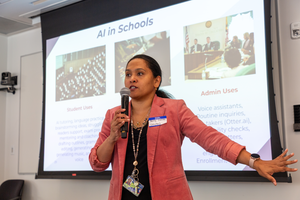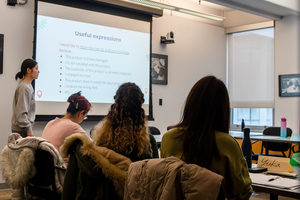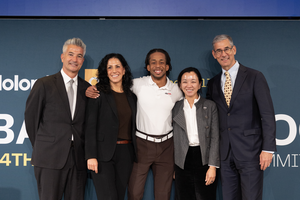Faculty Expert
-
Katharine O. Strunk
Dean, Graduate School of Education
Policy, Organizations, Leadership, and Systems Division -
L. Michael Golden
Vice Dean of Innovative Programs and Partnerships, Catalyst @ Penn GSE
Policy, Organizations, Leadership, and Systems Division -
Yasmin B. Kafai
Lori and Michael Milken President’s Distinguished Professor
Learning, Teaching, and Literacies Division -
Betty Chandy
Director for Online Learning, Catalyst @ Penn GSE
Policy, Organizations, Leadership, and Systems Division
On Oct. 30, more than 200 state and local policymakers, legislators, nonprofit leaders, and University AI experts gathered at the Annenberg Center for the Performing Arts for “Unlocking AI for the Public Good,” a landmark event hosted by the University of Pennsylvania and the office of Pennsylvania Governor Josh Shapiro. The convening spotlighted the critical role of higher education in shaping ethical, evidence-based AI policy and practice—and Penn GSE was front and center.
In her opening remarks, Penn GSE Dean Katharine Strunk, the George and Diane Weiss Professor of Education, emphasized the University’s civic mission and its commitment to translating research into real-world impact.
“A university is and must be more than a place that creates knowledge for its own sake,” she said. “It is a civic institution, charged with translating that knowledge into practices and policies that can measurably improve people’s lives.”
Dean Strunk framed the event as a reflection of Penn’s founding values, invoking Benjamin Franklin’s legacy of practical knowledge. “While Ben Franklin could never have imagined a world with generative artificial intelligence,” she noted, “AI certainly presents one of the greatest promises, and some of the greatest perils, of our time. And therefore, there is no better place in the world than Penn to work with our government partners to consider how best to harness this technology for the public good.”
Penn GSE’s leadership in AI is already notable through initiatives like the PASS program, a professional learning program co-designed with the School District of Philadelphia. Supported with a seed gift from the Marrazzo Family Foundation, PASS equips educators and administrators with tools to understand and apply AI in school settings. Earlier this week, Penn GSE announced $1 million of support from Google to expand the program to five additional districts across the region. Additionally, the School launched the Ivy League’s first degree program in AI in education and recently brought on board two new faculty members who specialize in the field.
“These collaborations have taught me that durable progress comes when we forge relationships of trust and mutual respect,” said Dean Strunk, highlighting her own experience working with school systems in California, Michigan, and now Pennsylvania. “We stand ready to collaborate—on research-practice partnerships, on professional learning, and on policy design informed by data and shaped with community stakeholders. Together, we will identify the questions that matter, test what works, and share what we learn openly so Pennsylvanians can reap the benefits.”

After opening remarks from Strunk, Penn Engineering Dean Vijay Kumar, and PA Secretary of Administration Neil Weaver, there were keynote addresses and lightning talks from faculty and student experts from across the University, addressing AI’s role in public service sectors from education to healthcare, criminal justice, and banking. In total, 9 of Penn’s 12 schools were represented, as well as the University of Pennsylvania Health System. University President J. Larry Jameson also spoke, announcing a new formal cooperative AI-advising agreement with the Commonwealth of Pennsylvania.
“As a national leader in AI education and research, with our technical excellence in multiple disciplines, Penn is well-positioned to partner with administrators and policymakers at all levels of government,” said President Jameson. “. . . This agreement will help connect our faculty's research and expertise to Commonwealth leadership in support of AI strategies, policies, and practices that benefit and protect all Pennsylvanians.”
In the afternoon, attendees were invited to focus on a subject area: banking, criminal justice, health and human services, or education. For those who chose the latter, Penn GSE played host to a presentation from Vice Dean of Innovative Programs and Partnerships Michael Golden and a panel featuring faculty engaged in AI work—Betty Chandy, Seiji Isotani, Shiyan Jiang, and Yasmin Kafai—alongside Carrie Rowe, PA’s acting secretary of education and moderated by Tori Shriver, PA’s Deputy Chief of Staff for Education and Workforce Development.
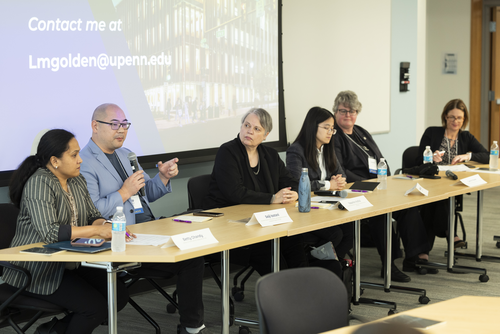
The discussion in the education track session ranged from specific examples of novel ways AI is already being used to help students worldwide, such as for live translation so non-native speaker students don’t fall behind in other subjects as they learn the local language, to how best to support teachers to implement AI tools in classrooms, to ensuring AI use is safe, ethical, and student-focused.
It was a visible demonstration of how Penn GSE and the wider University want to connect policymakers to vanguard research that could help them make imminent change in Pennsylvania.
“We want you to leave with tangible ideas—practical knowledge—you can put to use tomorrow,” said Dean Strunk. “And with new partners you can call on next week, next month, and next year.”
Media Inquiries
Penn GSE Communications is here to help reporters connect with the education experts they need.

